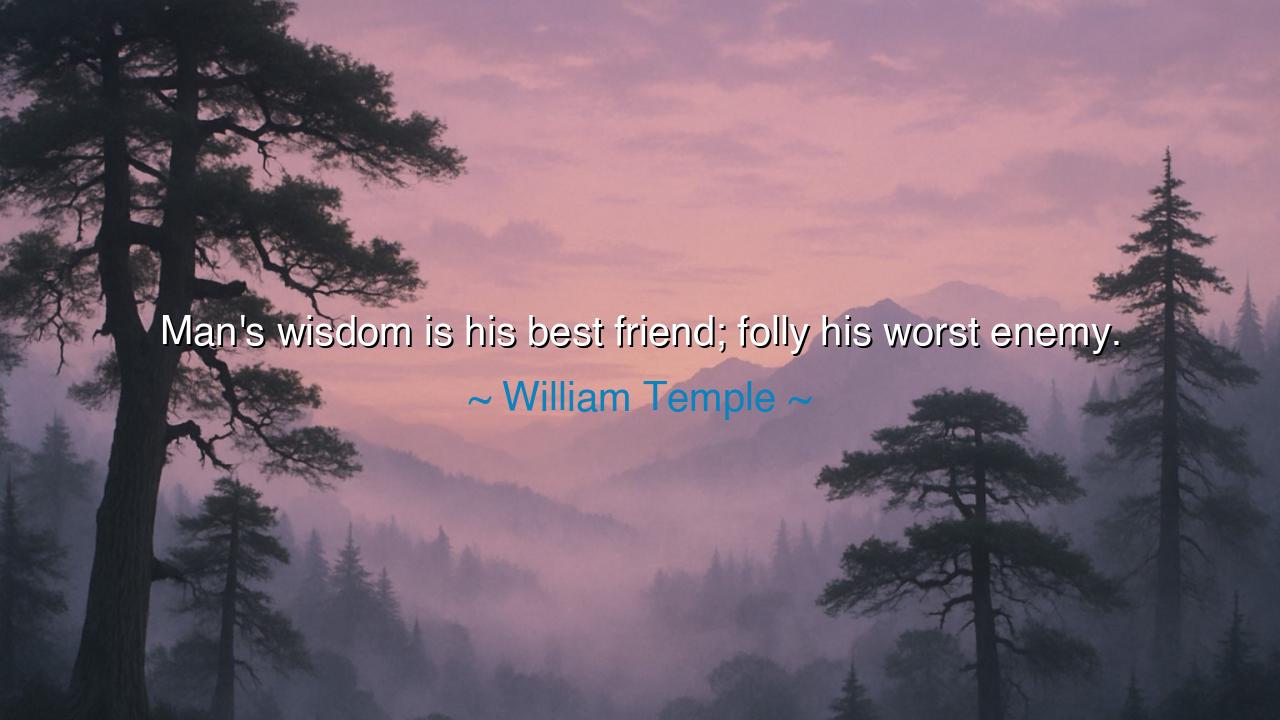
Man's wisdom is his best friend; folly his worst enemy.






O Seekers of Truth and Virtue, listen to the words of William Temple, who speaks of the power of the inner wisdom: "Man's wisdom is his best friend; folly his worst enemy." In these words, Temple reveals a profound truth about the human condition—that the greatest ally we have in this world is not found in riches, fame, or power, but in the wisdom we carry within. Wisdom is a light that guides us through the darkest times, a friend that whispers the right course when all else is uncertain. But folly, the absence of wisdom, is the shadow that leads us astray, the enemy that pulls us into the depths of suffering and destruction.
Consider, O Children, that in times of peace and prosperity, when the world seems at ease, it is easy to forget the value of wisdom. Many fall prey to the temptations of folly—acting in haste, indulging in desires without thought for the consequences, or choosing the path of immediate gratification over the long-term good. Folly is the enemy that works in subtle ways, seducing us into choices that seem harmless, but which lead to ruin. It is the wisdom that we carry in our hearts that shields us from these traps, helping us see the road ahead and choose the course that aligns with virtue and truth.
Look to the fate of King Solomon, whose wisdom was renowned across the lands. Solomon sought wisdom above all else, and in doing so, he was granted great prosperity and peace for his kingdom. His ability to discern right from wrong, to judge fairly, and to make wise decisions brought justice and order to his people. But there was a moment when even Solomon fell prey to the seductions of folly—turning away from the wisdom that had brought him so far. His later years were marred by alliances with foreign powers and the indulgence in desires that led to the weakening of his kingdom. In this, we see the truth of Temple's words: wisdom is the best friend, and folly the worst enemy.
And so, O Seekers, understand this vital teaching: to walk the path of wisdom is to walk the path of truth, justice, and self-mastery. It is a journey that requires vigilance, a constant battle against the forces of folly that seek to lead us astray. The wise man does not act in haste, but weighs his choices, looks to the future, and chooses the path that aligns with virtue. Folly is a seductive enemy, whispering that we can act without consequence, that we can indulge without fear of the future. But those who listen to folly will find themselves lost in the labyrinth of regret.
Let us, therefore, cherish the wisdom within us, for it is our greatest ally in a world filled with distractions and temptations. Like a true friend, wisdom stands by us in times of trial, guiding us to make decisions that bring peace, growth, and fulfillment. Let us strive, with every choice we make, to be ever more wise, and to cast aside the folly that leads us into the snares of suffering. The wisdom of the ages calls to us, urging us to be steadfast in the face of temptation, and to make choices that will secure our peace and prosperity, both now and for generations to come.






TVNguyen Thanhn Viet
This hits me at a gut level because my biggest regrets weren’t bad luck—they were avoidable misreads of reality. I’m trying to build a personal practice that nurtures clear seeing without sliding into perfectionism. What reflections would you recommend? Maybe a weekly log: decisions made, assumptions listed, what I noticed in the moment versus after, and one pattern to recalibrate next time. Are there simple mental guardrails—like “prefer reversibility,” “consult a contradictor,” or “timebox impulses”—that keep me from self-sabotage?
TTVan Anh Tran Thi
Part of me worries the word “folly” often gets weaponized to punish nonconformity. Many breakthroughs looked irrational to contemporaries. How do we separate thoughtless risk from pioneering bets that lack approval? Maybe the distinction hinges on the quality of hypotheses and the calibration of stakes. Can you propose criteria for labeling an action as irresponsible versus visionary—ideally ones that can be applied before results arrive, to avoid survivorship bias and moralizing after the fact?
VHPham Vu Hoang
Could we sketch a practical playbook for daily choices? For example: 1) pre-mortem a decision; 2) write a one-sentence principle you refuse to violate; 3) ask one smart outsider to poke holes; 4) set a small reversible experiment before a big leap; 5) define a failure stop-loss. Would this routine curb impulsive moves without killing momentum? Also, how do you teach this in teams so it becomes a shared habit, not just a personal virtue that burns out under pressure?
TNTram Ngoc
As a reader, I’m drawn to the metaphor that treats judgment and rashness like forces shaping our closest alliances. But how do we operationalize that in messy, real life? What signals tell me I’m listening to careful discernment rather than anxious avoidance dressed up as prudence? And when someone makes a risky choice that pays off, do we retroactively call it “wise” because of the outcome? I’d love a decision checklist that focuses on process quality—clarity of goals, evidence considered, dissent invited—so evaluations don’t depend on luck.